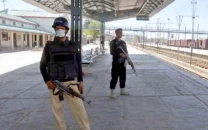Health campaigns: Polio immunisation drive re-launched
Parliamentary health secretary says MPAs should meet HIV patients publicly to erase negative perceptions.

District Coordination Officer Noorul Amin Mengal administered polio drops to several children at Khan Colony in Gulberg Town on Tuesday, launching a three-day campaign to immunise under fives in 50 union councils in the city.
The government, assisted by international health agencies, has conducted several campaigns to vaccinate children against polio all over Pakistan, one of the few remaining countries in the world where the disease still exists. However, thousands of families have refused the polio drops because of ignorance about the effects of the vaccine, officials say. Many of these families are of Pakhtoon ethnicity. At Tuesday’s ceremony, Mengal appealed to the residents of Khan Colony to ensure that their children get immunised against polio. Representatives of the World Health Organisation and the United Nations Children’s Fund (Unicef) and local health officials attended the event.
Earlier, the DCO met students learning Pashto and asked them about their experiences going door to door and informing Pathan residents of the city about the anti-polio drive. He thanked them for their service and handed out cash prizes and letters of appreciation from the government.
Presiding over a meeting at the Town Hall, Mengal directed city government officials to devote their full efforts to the anti-polio campaign. He assigned responsibility for monitoring performance and attendance among the members of the polio teams, saying that officials must be out in the field by 8am. He instructed them to check bus stands, the zoo and recreation areas of the city for children who had not been immunised.
The DCO also told off several officials for turning up late for the meeting or not attending the entire proceedings. The town municipal officers (TMOs) of Data Ganj Bakhsh Town, Ravi Town, Iqbal Town and Samanabad Town and the deputy district officers (health) of Wagha Town and Cantonment were late for the meeting. The TMOs of Nishter Town and Gulberg Town and the DDOs of Aziz Bhatti Town and Nishtar Town did not attend the entire meeting. They were instructed to hand in explanation letters for their conduct on Wednesday.
Far more HIV patients than reported
Special Health Secretary Babar Hayat Tarar has said that the number of HIV patients in the Punjab estimated by health organisations including the World Health Organisation and the United Nations Children’s Fund was much higher than the official record of 3,666 patients. Health organisations estimate the number of HIV patients in the country to be between 40,000 and 45,000.

He was speaking on Tuesday at an advisory meeting for MPAs organised in connection with World AIDS Day. He said Punjab was the only province in Pakistan where the government was running an AIDS Control Programme on its own for the past three years. He said the government would keep running this programme.
Special Assistant to the Chief Minister on Health Khawaja Salman Rafique said there was a dire need to launch a movement to raise awareness about various diseases. He said the number of patients would keep increasing if preventive measures were not taken seriously and then no amount of money or hospital beds would be enough to meet the demand.
Rafique said the increasing population was the biggest hurdle in planning healthcare needs. He called upon the clergy, the media and the public to play a role in controlling the population growth rate and preventing deadly diseases, like AIDS. He said the government was discharging its duties effectively to ensure dengue control on a permanent basis.
Parliamentary Health Secretary Dr Saeed Elahi said legislators should seek to remove negative perceptions by publically meeting with infected patients. He said legislators should also narrate the effects of HIV and AIDS in public to make people cautious. He said legislators should also work to frame effective laws to control viral diseases.
Dr Elahi suggested that members of parliaments who are also doctors by profession form a caucus to propose development policies. He said legislators should also consult the clergy and education institutions to strengthen campaigns regarding different diseases including AIDS. He said legislators should work in coordination with NADRA to collect data about patients with diseases and issue them treatment cards and immunisation cards to the patients.
Begum Shaista Pervaiz Malik, MPA Arifa Khalid, Maulana Raghib Naeemi and journalist Sohail Warriach made suggestions regarding prevention of HIV.
Punjab Control Programme Project Director Dr Salman Shahid gave a briefing regarding the steps taken by the government to control the disease.
Published in The Express Tribune, November 28th, 2012.



















COMMENTS
Comments are moderated and generally will be posted if they are on-topic and not abusive.
For more information, please see our Comments FAQ